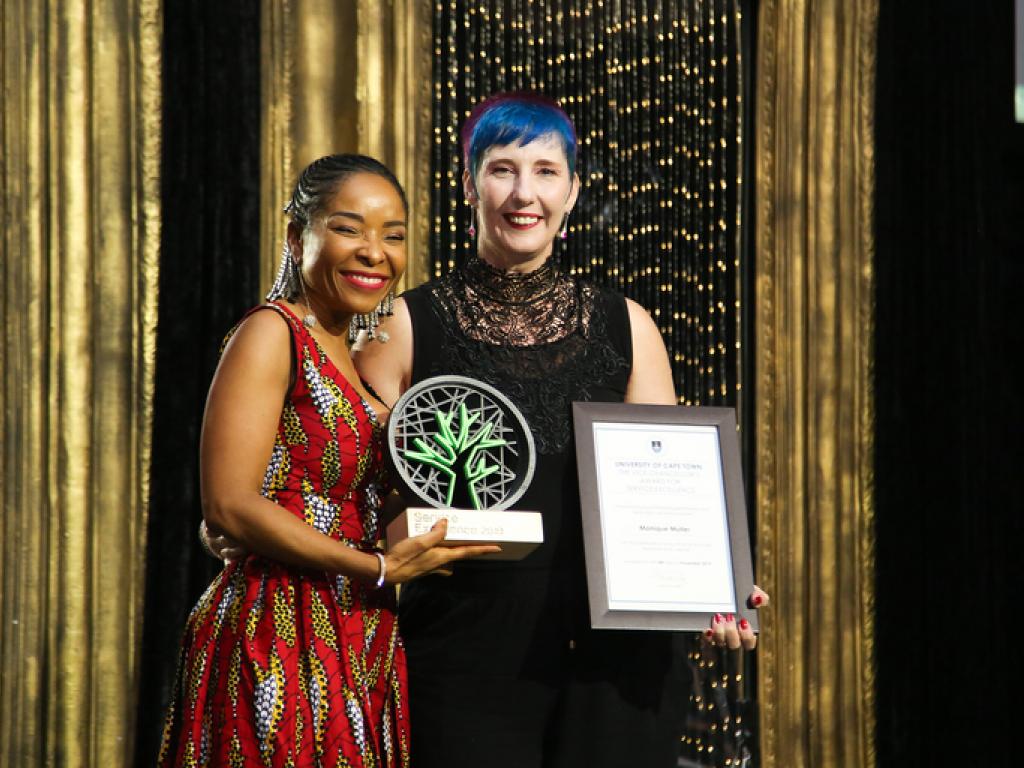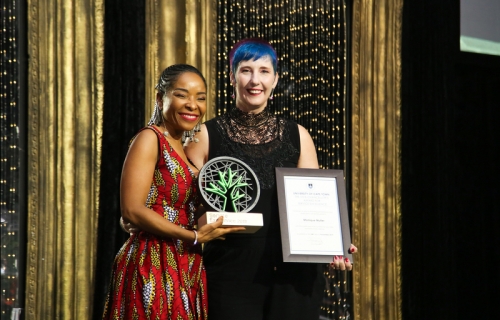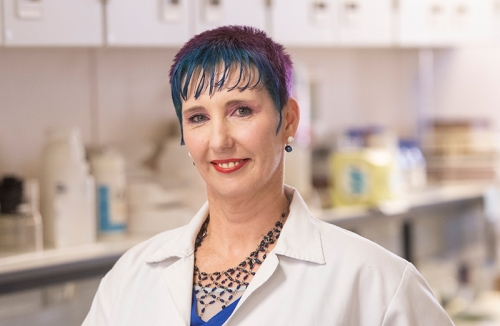Safety first: VC Award for big picture thinker


Chemical safety officer in the UCT Departments of Chemistry and Chemical Engineering, Monique Muller, won the Vice-Chancellor’s Award for Service Excellence. She was congratulated by VC Prof Mamokgethi Phakeng. Photo Je’nine May.
Chemical safety officer in the University of Cape Town (UCT) Departments of Chemistry and Chemical Engineering, Monique Muller, describes herself as a big picture person. Of necessity, she must be. On the floors above and below her upper campus office is a repository of 5 500 chemicals – many toxic, explosive or flammable.
There are also 14 permanent chemical waste streams just in the chemistry department that must be managed. Muller spends most of her time here; a ‘people’ complement that currently includes 16 professional, administrative and service staff, 25 academic staff and a whopping cohort of 81 postgraduates.
She assists the chemical engineering department more on a consultancy basis. It’s her job to ensure the chemicals in both departments are safely housed and used, to reduce the risk of accidents and threats to people and expensive infrastructure.
That she never forgets the weight of her task will come as good news to the staff and students who work with these sometime hazardous materials for their research, experiments and practical sessions in the laboratories.
Health and safety are her watchwords. And her diligence, meticulousness and dedication to her job have now been recognised via a Vice-Chancellor’s Award for Service Excellence. This annual award acknowledges “outstanding service by staff who have contributed to the delivery of exceptional and significantly improved services to UCT’s staff and students”. It was presented to Muller at the glittering UCT Annual Awards 2019 on Thursday, 28 November.
Devil’s advocate
Muller is a trained microbiologist (she has three master’s degrees) and is a registered occupational safety professional at the Institute of Safety Management with almost 19 years of health and safety and laboratory management experience.
“I usually play devil’s advocate as I actively seek out the gaps in procedures, processes or practices and ways to fill them.”
“To the dismay of most people, I usually play devil’s advocate as I actively seek out the gaps in procedures, processes or practices and find ways to fill them,” she said.
Her task is then to implement recommendations and carefully control and manage these, assessing the hazards and risks in the undergrad practical, research and analysis laboratories; chemical, gas and waste stores; and putting contingency plans and operating procedures in place to minimise risks and prevent accidents.
“I constantly remind myself not to see my job as chemical safety officer in isolation or focus just on what is in my job description, but rather to look at the bigger picture.”
Muller also ensures all relevant legislation (including all occupational health and safety, environmental and waste management legislation) is adhered to.
She sees to health and safety induction training for all staff, students and visitors, and physical inspections. She also thoroughly investigates incidents (“even if they are near-misses”) and implements recommendations. Muller also communicates regularly with health and safety representatives and building custodians.

Monique Muller, chemical safety officer in the Departments of Chemistry and Chemical Engineering. Photo Brenton Geach.
Community safety
She doesn’t view the chemistry department as an island, but as part of a PD Hahn building community. At least 11 different divisions or departments occupy the building.
Beyond UCT, Muller also assists other departments and divisions in the Science, Health Sciences and Engineering and the Built Environment Faculties. She’s active in her outreach to schools, other universities and private entities to help them establish health and safety procedures in their own laboratories.
Muller is creative in finding avenues to generate extra funds for health and safety purposes. Indefatigable, the safety doyenne has written and presents two UCT-accredited health and safety short courses, aimed at laboratory staff and students. These are also open to the public, which helps to generate extra funding.
People chemistry
One would imagine that chemicals are the most challenging aspect of her job. But it’s people – and getting the health and safety message to stick.
“Students, staff and visitors need to be reminded how important safety is and how to responsibly use, correctly store and dispose of chemicals and hazardous waste. But they also need to know what to do if something does go wrong.
“I am a stickler when it comes to adhering to the health and safety rules, standard operating procedures and policies.”
“Therefore, I’m a very strict, no-nonsense, but fair person. I am a stickler when it comes to adhering to the health and safety rules, standard operating procedures and policies. And proper housekeeping: clean work areas and maintenance of infrastructure and existing health and safety or emergency features.”
Her advice to staff and students: “Get to know Murphy’s law well. That will assist you in planning ahead – and bring small and larger projects to success.”
“A tear or two”
Her response to winning the Vice-Chancellor’s Service Excellence Award was “very emotional”.
“I felt humble as it was my supervisor, the HOD of Chemistry, Professor Timothy Egan, together with two references, Professor Neil Ravenscroft and Professor Anwar Jardine, who nominated me.
“I did shed a tear or two as I felt proud and very gratified simultaneously; proud also of chemistry’s staff and students who were all willing [to come on board] after my appointment by the then-HOD of Chemistry, Professor Susan Bourne.
“Everyone in [the department] became my trusted team member, but in particular our health and safety appointees without whom I wouldn’t be receiving this award.”
Her celebration is dedicated to her grandfather, Hannes Coertse (“my life’s mentor who looked out for my future”), mother, Donnette Watkins (“who helped me to be a strong, independent woman”), and husband Christo (“who supports my career decisions and celebrates my strong will – and who doesn’t sulk because I am more technically inclined than he is!”).
Story: Helen Swingler
